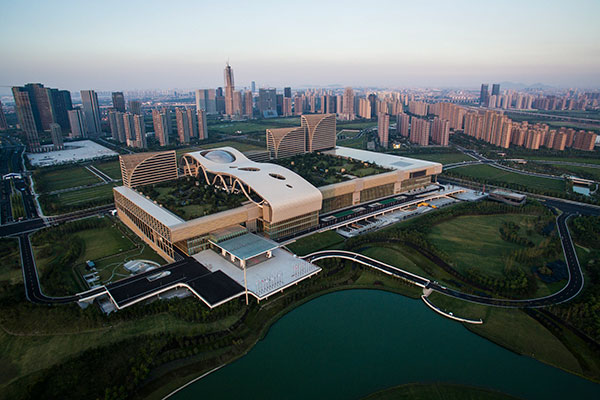
Photo taken on Aug 25, 2016 shows the Hangzhou Olympic and International Expo Center in the Binjiang District of Hangzhou, capital of east China’s Zhejiang province. Hangzhou is the host city for the upcoming G20 Summit.[Photo/Xinhua]
MELBOURNE — As one of the world’s leading economies and the host of the upcoming G20 summit, China is widely expected to inject dynamism into the group and be a part of the rule-making that will affect the future of the whole world, an Australian researcher told Xinhua in a recent interview.
Susan Harris Rimmer, an Australian Research Council Future Fellow in the Asia-Pacific College of Diplomacy at the Australian National University, said there are high expectations that China’s G20 presidency breathes new vitality into the group.
The G20 mechanism makes part of the “war cabinet” for the global economy, and it also functions like a steering committee to achieve sustainable and inclusive growth, said Rimmer, who served as a policy adviser to the Australian government.
As a premier forum for international economic cooperation, the G20 fills an important governance gap, she said, adding that everyone wants to know how China will lead as an economic power.
“I hope China brings new ideas to the table, about dealing with climate change and trade and finally bringing some progress on issues like IMF reform,” said Rimmer, who attended the G20 summit in St. Petersburg in 2013 and in Brisbane in 2014.
The world has pinned high hopes on China’s perspective and experience in steering G20 toward a more balanced power-sharing model and a more constructive path for the global economy, she said.
She agreed that the ultimate solution to most of the urgent problems needs to bring major industrialized economies as well as emerging markets together and foster closer cooperation among them.
Rimmer said “China has declared an interest in representing the developing world and being their G20 champion,” and “if China can promote action towards the achievement of the UN 2030 Development Agenda, that will be a significant achievement.”
Echoing Glenn Stevens, who recently retired as the Australian Reserve Bank governor, Rimmer said the G20 summit in Hangzhou comes amid a new wave of monetary easing policies by central banks around the world and the extent of reliance on monetary policy is worrying.
Such measures would not be as effective in boosting growth as many have expected, and the G20 leaders will have to chart a new path out of a sluggish global growth, she said.
One of the highlights of the G20 summit in Hangzhou would be a blueprint for innovative growth, which includes a concrete action plan for a new industrial revolution. Rimmer said she was optimistic about the outcome of the two-day event.
“G20 needs to focus on building confidence and dynamism with new ideas and agendas. China is to be congratulated for focusing on new and transformative kind of economic activities, such as the digital economy. I am looking forward to the new G20 blueprint for innovative growth,” she said.
